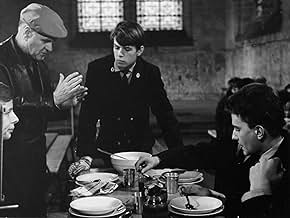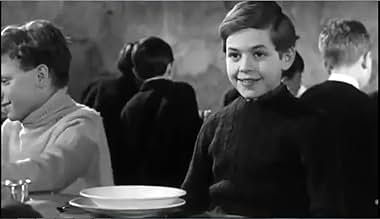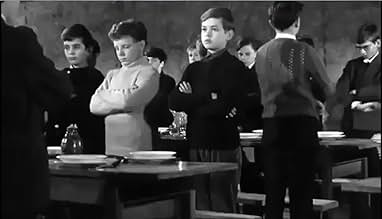IMDb-BEWERTUNG
7,7/10
3213
IHRE BEWERTUNG
Füge eine Handlung in deiner Sprache hinzuA tale of the tender relationship between a 12-year-old boy and the upperclassman who is the object of his desire in the rigid atmosphere of their Jesuit-run school.A tale of the tender relationship between a 12-year-old boy and the upperclassman who is the object of his desire in the rigid atmosphere of their Jesuit-run school.A tale of the tender relationship between a 12-year-old boy and the upperclassman who is the object of his desire in the rigid atmosphere of their Jesuit-run school.
- Regie
- Drehbuch
- Hauptbesetzung
- Auszeichnungen
- 1 Nominierung insgesamt
Gérard Chambre
- André Ferron
- (Nicht genannt)
Henri Coutet
- L'employé de l'institution
- (Nicht genannt)
Dominique Diamant
- Maurice Motier
- (Nicht genannt)
Alain-Philippe Malagnac
- Un élève
- (Nicht genannt)
Bernard Musson
- Le père enseignant
- (Nicht genannt)
Colette Régis
- La religieuse
- (Nicht genannt)
Empfohlene Bewertungen
French cinema has always been, if not the most profound and analytic in the world, indeed, the one that sets the benchmark. In this beautifully shot film, Delanoy tackles a difficult subject matter (for our days) that wasn't so then. When I saw Les Amities Particulieres for the first time, I simply couldn't realise how important it was. Now, after many years, I find it much more interesting than it would have been in the sixties. Many others have already written about the story. I will delve into a different approach: today's reality, at the beginning of the 21st Century.
The strength of our mediated world has increased exponentially and it will keep on growing. The way we look at our world today is consistently chiseled by the way information is provided, dissected, manipulated and delivered. We just consume it. With it, the apocalyptic view on pedophilia that, by the way, means affinity, love, for boys has been transformed completely.
Maybe we're more than insane today than in the 40's or the 70's, but by then people were not scared at all by this kind of love, even when it was clearly seen as sin if sexuality was involved. For us, pedophile means stalker, assassin, assailant, or, as the media loves to call them: molester.
It's a good idea to watch this film with an open mind. What happens has happened for centuries and will happen ever after, until the human race disappears. May this words imply that I defend pedophiles? Yes. I can't defend a criminal, but I can defend someone who loves another human being and is loved in response. Georges loves Alexandre and Alexandre is absolutely in love with him, despite the age gap (at that age, the gap is even more pronounced). Alexandre makes Georges swear his love for ever, his "special friendship", and writes him touching letters that only lovers can write. They simply can't help not loving each other, despite of the many obstacles in their way.
In today's perspective, Georges is a pedophile, a stalker, a child molester who would never, ever molest a child... a stalker that is stalked by his prey because... he loves him. This bond grows so strong that is shared with close friends that encourage this relationship.
What would the media say about something like this TODAY???? We all know the answer.
This film can teach, too, a lot in cinematographic techniques. The use of the camera is unusual for its time. Maybe one of the most daring movements is when Georges arrives in one of the first scenes of the film. The unique way of depicting the corridors in the cloister is another "first", when the steadycam wasn't even in a dream.
And, story-wise, we have to credit this film with one of the most powerful endings in cinema: after the "Fin" frames we discover the very last testament of Georges unread letter to Alexandre, which ends with the word "amour". All in all, a must-see.
If you want to consider further what I said before (I know it will be hard for many people to swallow) I recommend watching "Wild Tigers I Have Known", a 2006 film made by Cam Archer, 26. It draws a similar scenario assuming life as it is now. I caution you that this film is very experimental (underline very), so it may be confusing and without a clear conclusion. That, is yours to make.
The strength of our mediated world has increased exponentially and it will keep on growing. The way we look at our world today is consistently chiseled by the way information is provided, dissected, manipulated and delivered. We just consume it. With it, the apocalyptic view on pedophilia that, by the way, means affinity, love, for boys has been transformed completely.
Maybe we're more than insane today than in the 40's or the 70's, but by then people were not scared at all by this kind of love, even when it was clearly seen as sin if sexuality was involved. For us, pedophile means stalker, assassin, assailant, or, as the media loves to call them: molester.
It's a good idea to watch this film with an open mind. What happens has happened for centuries and will happen ever after, until the human race disappears. May this words imply that I defend pedophiles? Yes. I can't defend a criminal, but I can defend someone who loves another human being and is loved in response. Georges loves Alexandre and Alexandre is absolutely in love with him, despite the age gap (at that age, the gap is even more pronounced). Alexandre makes Georges swear his love for ever, his "special friendship", and writes him touching letters that only lovers can write. They simply can't help not loving each other, despite of the many obstacles in their way.
In today's perspective, Georges is a pedophile, a stalker, a child molester who would never, ever molest a child... a stalker that is stalked by his prey because... he loves him. This bond grows so strong that is shared with close friends that encourage this relationship.
What would the media say about something like this TODAY???? We all know the answer.
This film can teach, too, a lot in cinematographic techniques. The use of the camera is unusual for its time. Maybe one of the most daring movements is when Georges arrives in one of the first scenes of the film. The unique way of depicting the corridors in the cloister is another "first", when the steadycam wasn't even in a dream.
And, story-wise, we have to credit this film with one of the most powerful endings in cinema: after the "Fin" frames we discover the very last testament of Georges unread letter to Alexandre, which ends with the word "amour". All in all, a must-see.
If you want to consider further what I said before (I know it will be hard for many people to swallow) I recommend watching "Wild Tigers I Have Known", a 2006 film made by Cam Archer, 26. It draws a similar scenario assuming life as it is now. I caution you that this film is very experimental (underline very), so it may be confusing and without a clear conclusion. That, is yours to make.
Francis Lacombrade stars as the young Comte Georges de Sarre, student at a French boarding school run by the priests. Didier Haudepin is the even younger Alexandre, another student at the same school. It is post WWII France, and the school is run with heavy discipline.
Georges develops a special friendship with Alexandre, hence the title of the novel and the movie made from the novel. Roger Peyreffite is quite a famous French author, and this story is his best work.
The two boys develop their friendship in spite of the rules of the fathers who are dead set against this sort of thing happening at their school. Not that there is anything sensual about the relationship, just a few chaste kisses and poems with Georges describing Alexandre as his "bijoux".
There is a touching scene in the movie with the two boys hidden in a haystack lying besides each other, sharing the joy of their company and a stolen cigarette.
Not to give away the ending, but tragedy befalls the two boys.
Interesting to note that a friend of Peyreffite, who also worked as a French civil servant, Henri de Montherlant also wrote a novel about the love between two boys. The Boys is also set in a Catholic boarding school, but around the turn of the 19th century. And a similar tragic ending.
In both stories, the Church and its rules against too much affection between schoolboys plays a major role in the story as one of the antagonists. We are left wondering just how well both stories might have turned out if the boys had been left alone to share their friendships.
Georges develops a special friendship with Alexandre, hence the title of the novel and the movie made from the novel. Roger Peyreffite is quite a famous French author, and this story is his best work.
The two boys develop their friendship in spite of the rules of the fathers who are dead set against this sort of thing happening at their school. Not that there is anything sensual about the relationship, just a few chaste kisses and poems with Georges describing Alexandre as his "bijoux".
There is a touching scene in the movie with the two boys hidden in a haystack lying besides each other, sharing the joy of their company and a stolen cigarette.
Not to give away the ending, but tragedy befalls the two boys.
Interesting to note that a friend of Peyreffite, who also worked as a French civil servant, Henri de Montherlant also wrote a novel about the love between two boys. The Boys is also set in a Catholic boarding school, but around the turn of the 19th century. And a similar tragic ending.
In both stories, the Church and its rules against too much affection between schoolboys plays a major role in the story as one of the antagonists. We are left wondering just how well both stories might have turned out if the boys had been left alone to share their friendships.
This is the film adaptation of Roger Peyrefitte's novel telling the deeply moving love story of brilliant 16 year-old aristocrat Georges de Sarre and beautiful 12 year-old Alexandre Motier at St. Claude's, a French, Catholic boarding-school in the 1920s. Though chaste, their love is passionately expressed through poems, gazes and the odd kiss, and there is no mistaking the sensuality underpinning it.
Whether consummated or not, for many centuries such intense love affairs between younger and older boys were a feature of boarding-school life that brought joy and relief to some of the more feeling and less hung-up sort of adolescents, as well as grief and catastrophe to the minority whose liaisons were discovered and crushed by the Christian authorities. They were essentially pederastic, satisfying different emotional needs in the younger and older participants, though the disparity in age lent them special intensity for both.
This ancient tradition more or less died a generation or so ago; the boys who would once have partaken or at least have approved of romantic friendships nowadays either never see their appeal, brought up as they are in a society so antagonistic to them, or shun them through terror of being misunderstood and branded as gay. Indeed, the number of reviews of this film implying gayness is proof they are right to fear it is now practically impossible to escape being judged according to the new dogma insisting on a fixed sexual orientation for even early teens.
It is salutary to remember that however responsible the priests at St. Claude's were for the tragedy of Alexandre and Georges and however misguided the abhorrence of sin that drove them to act as they did, they acted as gentle lambs compared to the savagery with which their post-Christian successors today would crush an affair that any older and younger boy had the temerity to get embroiled in. Our new moral dictators would of course destroy Alexandre to save him from an unequal relationship rather than from the sin of homosexuality, but that would make no difference to either the cruel outcome or the monstrous bigotry behind it. Ironically it would actually increase the perverse injustice of such interference: Alexandre is typical of the younger boy in a special friendship in that his emotional need for it is evidently greater and so it is even more vital to his happiness than to Georges's that it should not be broken up.
Considering special friendships at boarding-school seem to have disappeared from our emotional landscape and are now so badly misunderstood, we must be forever thankful that in the short space of time when they were still fairly widely understood and it had also become possible to write candidly about such delicate matters, not only did such a talented writer as Peyrefitte preserve their character for us so evocatively, but that a film was made of it before the moral panic about teenage sexuality which arose in the 80s made such an undertaking unthinkable.
Unsurprisingly, the film is not as outstanding as the novel, though mostly faithful to it. The most significant change is that, in the novel, Georges was only fourteen, but as he seemed a little improbably sophisticated for even a French patrician of that age, this was actually an improvement. The problem with the adaptation to film is largely the common one of condensation. Because we do not get to know the protagonists quite so well, it is harder to be so deeply moved by their plight. Mostly gone too is the richly elaborated conflict in the boys' minds between the influences of puritanical Christian doctrine and the boy-admiring Graeco-Roman attitudes it drove into hiding. Nevertheless, the film is well acted, atmospheric and near the end soars towards the heights of aching pathos achieved in the novel.
Peyrefitte was much involved in the making of the adaptation to film, which makes for a fascinating footnote: he was rewarded by meeting on the set the love of his life, 12-year-old Alain-Philippe Malagnac, who had a minor role in the film as a choirboy and introduced himself to the author as a fan of the novel, a story Peyrefitte recounted in Notre amour (1967).
Edmund Marlowe, author of Alexander's Choice, an Eton love story, www.amazon.com/dp/1481222112
Whether consummated or not, for many centuries such intense love affairs between younger and older boys were a feature of boarding-school life that brought joy and relief to some of the more feeling and less hung-up sort of adolescents, as well as grief and catastrophe to the minority whose liaisons were discovered and crushed by the Christian authorities. They were essentially pederastic, satisfying different emotional needs in the younger and older participants, though the disparity in age lent them special intensity for both.
This ancient tradition more or less died a generation or so ago; the boys who would once have partaken or at least have approved of romantic friendships nowadays either never see their appeal, brought up as they are in a society so antagonistic to them, or shun them through terror of being misunderstood and branded as gay. Indeed, the number of reviews of this film implying gayness is proof they are right to fear it is now practically impossible to escape being judged according to the new dogma insisting on a fixed sexual orientation for even early teens.
It is salutary to remember that however responsible the priests at St. Claude's were for the tragedy of Alexandre and Georges and however misguided the abhorrence of sin that drove them to act as they did, they acted as gentle lambs compared to the savagery with which their post-Christian successors today would crush an affair that any older and younger boy had the temerity to get embroiled in. Our new moral dictators would of course destroy Alexandre to save him from an unequal relationship rather than from the sin of homosexuality, but that would make no difference to either the cruel outcome or the monstrous bigotry behind it. Ironically it would actually increase the perverse injustice of such interference: Alexandre is typical of the younger boy in a special friendship in that his emotional need for it is evidently greater and so it is even more vital to his happiness than to Georges's that it should not be broken up.
Considering special friendships at boarding-school seem to have disappeared from our emotional landscape and are now so badly misunderstood, we must be forever thankful that in the short space of time when they were still fairly widely understood and it had also become possible to write candidly about such delicate matters, not only did such a talented writer as Peyrefitte preserve their character for us so evocatively, but that a film was made of it before the moral panic about teenage sexuality which arose in the 80s made such an undertaking unthinkable.
Unsurprisingly, the film is not as outstanding as the novel, though mostly faithful to it. The most significant change is that, in the novel, Georges was only fourteen, but as he seemed a little improbably sophisticated for even a French patrician of that age, this was actually an improvement. The problem with the adaptation to film is largely the common one of condensation. Because we do not get to know the protagonists quite so well, it is harder to be so deeply moved by their plight. Mostly gone too is the richly elaborated conflict in the boys' minds between the influences of puritanical Christian doctrine and the boy-admiring Graeco-Roman attitudes it drove into hiding. Nevertheless, the film is well acted, atmospheric and near the end soars towards the heights of aching pathos achieved in the novel.
Peyrefitte was much involved in the making of the adaptation to film, which makes for a fascinating footnote: he was rewarded by meeting on the set the love of his life, 12-year-old Alain-Philippe Malagnac, who had a minor role in the film as a choirboy and introduced himself to the author as a fan of the novel, a story Peyrefitte recounted in Notre amour (1967).
Edmund Marlowe, author of Alexander's Choice, an Eton love story, www.amazon.com/dp/1481222112
I had read the novel (in English translation, one of two which have been published?) several years before seeing the film. It is, I think, characteristically French: carefully descriptive, observant, objective, restrained, but also subtly hypnotic. I read and read, and almost put the book down halfway through because it didn't seem to be going anywhere or making any impact on me. Then, all of a sudden, I was in tears-- but I still couldn't say exactly what had hit me other than everything. It was as though the pieces of a puzzle suddenly fell into place.
The film is faithful to the spirit as well as the letter of the book. Both were remarkably bold gestures for their time, describing an earlier generation and environment which were even more strait-laced. Like me, you may fall gently under its spell, then-- wham! Sheer magic.
The film is faithful to the spirit as well as the letter of the book. Both were remarkably bold gestures for their time, describing an earlier generation and environment which were even more strait-laced. Like me, you may fall gently under its spell, then-- wham! Sheer magic.
10ricbigi
I have long wished to see this film and finally a DVD of it has been made available, so I watched it with enormous curiosity. I must say I am very much touched by LES AMITIÉS PARTICULIÈRES, for everything rings absolutely true in this film. The screenplay by Jean Aurenche and Pierre Bost is perfection itself, rending Peyrefitte's autobiographical novel totally cinematic, visually striking and emotionally devastating. The acting by the two leading men is beyond anything I could have expected from such young performers. Didier Haudepin gives the best performance by a child actor I have ever seen in fifty-some years of film-going, standing alongside the likes of Patty Duke in THE MIRACLE WORKER, Brigitte Fossey in LES JEUX INTERDITS and Enzo Staiola in LADRI DI BICICLETTE. The supporting cast is equally to be praised, particularly the great Michel Bouquet. Frankly, Jean Delannoy deserves ample credit for having brought to the screen a film of such beauty and flawless artistry. I believe François Truffaut has never done anything that even approaches such a high level of film-making.
Wusstest du schon
- WissenswertesIn the source novel, Georges de Sarre is 14 years old and Alexandre Motier is 12 years old. However, the year in which the film was made, Francis Lacombrade (1942-) was 22 years old and Didier Haudepin (1951-) was 13 years old.
- PatzerWhen Lucien looks at his watch we can see that the time is 6:15 but he reads it as 10:35.
Top-Auswahl
Melde dich zum Bewerten an und greife auf die Watchlist für personalisierte Empfehlungen zu.
- How long is This Special Friendship?Powered by Alexa
Details
- Erscheinungsdatum
- Herkunftsland
- Sprache
- Auch bekannt als
- This Special Friendship
- Drehorte
- Abbaye de Royaumont, Asnières-sur-Oise, Val d'Oise, Frankreich(jesuit college where the story takes place)
- Produktionsfirmen
- Weitere beteiligte Unternehmen bei IMDbPro anzeigen
- Laufzeit1 Stunde 40 Minuten
- Farbe
- Sound-Mix
- Seitenverhältnis
- 1.78 : 1
Zu dieser Seite beitragen
Bearbeitung vorschlagen oder fehlenden Inhalt hinzufügen

Oberste Lücke
By what name was Heimliche Freundschaften (1964) officially released in India in English?
Antwort




















